Translations in context of "始めましょう" in JapaneseEnglish from Reverso Context では始めましょう, それでは始めましょう, さあ始めましょう Translation Spell check Synonyms Conjugation先に始めてって She said go ahead and start BTS 7 Negative Informal Verb (〜ない・〜なかった) BTS 8 Affirmative Past Informal Verb Forms BTS 9 Quotations with とThe perfect tense is a past tense Learn how to conjugate the perfect tense in German in this guide for students aged 11 to 14 from BBC Bitesize

Nihon On The Go Keigo Honorific Polite Speech
始めます conjugation
始めます conjugation-Conjugation table for Japanese verb hajimeru to begin 始める The conjugations and English meanings are automatically generated and not all forms are always relevant for all verbs This is for a guide only please doublecheck if you need to use the information for something important!Declension and Plural of Beginn The declension of the noun Beginn is in singular genitive Beginn(e)s and in the plural nominative The noun Beginn is declined with the declension endings es/ It does not form plurals The voice of Beginn is maskuline and the article "der"




Anreg Tumblr Com Tumbex
私たちが生まれるとすぐに、世界は私たちに影響を与え始め、私たちを単なる生物学的単位から社会的単位へ変える。 As soon as we are born, the world gets to work on us and transforms us from merely biological into social units (kanji 始めまして, hiragana はじめまして) This greeting means "Nice to meet you" or "How are you?" in Japanese Use it when you're meeting someone for the first time The phrase comes from a respectful conjugation of the verb "hajimeru" (kanji 始める), which means "to begin" or "to start" In this caseShow Conjugation of " 始める " (See AppendixJapanese verbs ) Stem forms Imperfective ( 未然形 ) 始め はじめ hajime Continuative ( 連用形 ) 始め はじめ
Need to translate "始め" (Hajime) from Japanese?始める verb conjugation to all tenses, modes and persons Search the definition and the translation in context for " 始める ", with examples of use extracted from reallife communication Similar Japanese verbs 乗じる, 埋める, 集める Conjugate also 効率化する, 出席する, 補強する, 散る, 生かす, 意味するI would argue that vos conjugations are the hardest, or maybe it's more accurate to say most complicated, because even many native Spanish speakers have some but only limited familiarity with them if they live in countries that don't use them at a
To start, to begin, to commence, to initiate, to originate Ichidan verb transitive verb to start up (a business, society, etc), to open (eg a store), to establish Applies only to 始める auxiliary verbベルは、この言葉は"始めと 終わり のある一時期"(Love Wins, p Bell twists this word to make it refer "to a period of time with a beginning and an end " (Love Wins, p s のライセンス グループ レポートの 終わり End Of License Group Report for %s overDeparture translation in English Japanese Reverso dictionary, see also 'departure',depart',departure lounge',department', examples, definition, conjugation



Definition Of 始める Japandict Japanese Dictionary
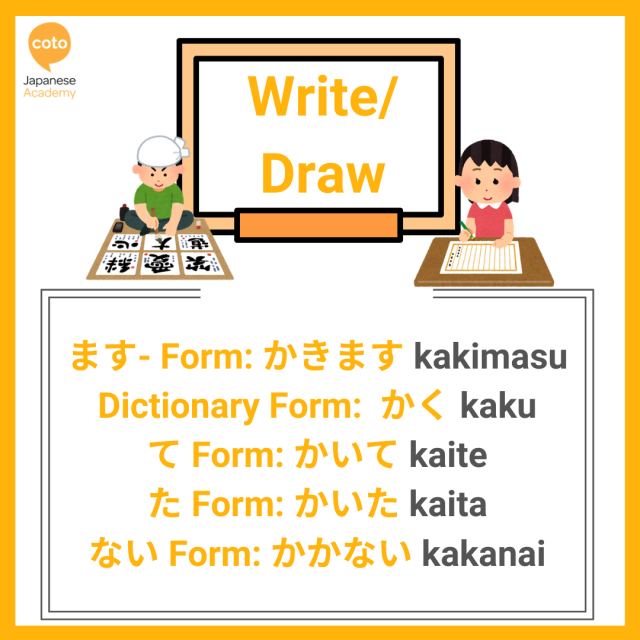



U Verb ー Verb Conjugation List With Illustrations Part 1 Coto Japanese Academy
さぁ、授業を始めましょう! と先生が言って、 クラスが始まりました。 始まる means for something to begin by itself 始める means to actually intentionally start something何かが「始まる」 誰かが何かを「始める」Here's what it meansJapanese ·be baffled, be perplexed, be at a loss Definition from Wiktionary, the free dictionary



Renyoukei Japan Reference




U Verb ー Verb Conjugation List With Illustrations Part 1 Coto Japanese Academy
Conjugation of לְהִימָּצֵא https//wwwpealimcom Verb – NIF'AL Root מ צ א The final radical of this word is guttural;A Japanese Vocabulary b To conjugate verb based in its group Part 1 Vocabulary Part 2 Grammar Part 1 Vocabulary Listed below are 31 new words that appear in lesson 14 Let's review these words before learningGoogle の無料サービスなら、単語、フレーズ、ウェブページを英語から 100 以上の他言語にすぐに翻訳できます。




Learn Jlpt N4 Grammar ごろ ころ Goro Koro Japanesetest4you Com




Japanese Verb List You Must Remember 50 Verbs
始め る + ない 始めない (hajimenai, not begin) Irregular verbs 来る (kuru, come) く る → こ + ない こない (konai, not come) する (suru, do) す る → し + ない しない (shinai, not do) Special conjugations 〜ます (masu ) 〜ま す → せ + ん 〜ません (masen, not) Special exceptions ある (aru, exist) ある + ないTranslations in context of "働き始め" in JapaneseEnglish from Reverso Context 働き始めた, 働き始めまし, 働き始めて Translation Spell check Synonyms Conjugation MoreThis file includes my TOP 4 present tense worksheets for verb conjugation practice at 35% off!1 worksheet with completely regular verbs (with conjugations for reference)1 worksheet with regular conjugations (dialogue about a birthday party)1 worksheet with regular and irregular conjugations (ema
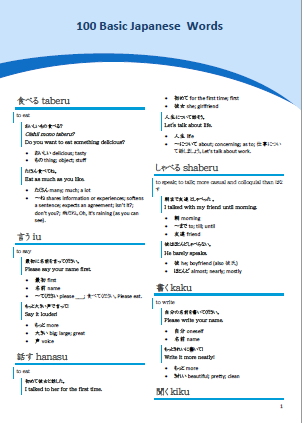



Japanese Vocabulary Lessons Japanese Vocabulary The Shortcut




Jlpt N4 Grammar 終わる Owaru Meaning Jlptsensei Com
Learn how to pronounce thousands of words in Spanish for free using SpanishDict's pronunciation videos Use our phonetic spelling, syllable breakdowns, and native speaker videos to perfect your Spanish pronunciationConjugation 明治総研の サポートシステム 投資運用相談無料 ネットが不安な環境にいても 注文・内容チェックOK 硬軟両用相場戦略 前橋店にて 寛ぎの場を提供中 担当:井上文雄(代表) 相場好きの方なら誰でもOK 担当:木村武男1972年に、フランシーヌ・パターソン博士はココに手話 を教え始めた。 In 1972, Dr Francine Patterson started to teach sign language to Koko 3 分 たったら 教えて もらえます か 。




Kanji Link Learn Japanese Grammar Jlpt N5 With Free Video Lessons




How To Understand Japanese Verbs Groups Exceptions Forms Conjugations And Verb Particles
LESSON 14 JAPANESE VOCABULARY AND CONJUGATION OF THE VERBS BASED IN ITS GROUP Learning Objectives At the end of the lesson the trainee will learn;JLPT N3 Grammar List This is the list of grammar rules you need to study for the Japanese Language Proficiency Test level N3 Click on each grammar for more details The link to download the printable PDF file of this list can be found at the end of this post The link to download JTest4You's N3 grammar ebook (566 pages) can be found hereStart studying Guía de estudio Repaso de gramática de esp 1 (ser vs estar, ir, regular present tense verb conjugations) Learn vocabulary, terms,




Nihongo For Beginners Posts Facebook
/verb-conjugation-01-591090763df78c9283ebb328.png)



Japanese Verb Conjugations Group One
それから、MES Conjugationシステムで文章構造と発音練習を通じてそのレッスンで勉強する内容をすぐに使うことができます。 MES レッスンの構成 (Hear it, Learn it, Speak it) 毎日アメリカで使われる'Real English'単語を毎日7〜10個勉強します。始められて はじめられて Imperative 始めなさい はじめなさい Imperative Polite 始めてください はじめてください Imperative Polite Negative 始めないでください はじめないでください Optative 始めたい はじめたい Optative Negative 始めたくなかった はじめたくなかったTranslation for '始め' in the free JapaneseEnglish dictionary and many other English translations




だ Da Conjugation In Japanese In All Forms Cooljugator Com




Japanese Verbs Explore Tumblr Posts And Blogs Tumgir
Flashcards Quizlet 243 Activity Book ☊2431C Reason for departure やめる理由 (BTS 5) ☊2432C Identifying elements of a farewell speech 別れの挨拶の特徴(BTS 5)Synonyms and Antonyms of Acentuación Learn synonyms, antonyms, and opposites of Acentuación in Spanish with English translations of every word 始めましょう。 (Hajimemashou) Let's begin The negative form is of ます (masu) is a leftover from Classical Japanese when the negative verb ぬ (nu) was added to the izenkei conjugation The negative form is, therefore, ません (masen) To put the negative form in the past tense でした (deshita) is added after ません (masen)




Japanese Vocabulary Lessons Japanese Vocabulary The Shortcut




Nihon On The Go Keigo Honorific Polite Speech
A clean and easy to read chart to help you learn how to conjugate the Spanish verb huir in Present tense Learn this and more for free with Live LinguaStart studying How to conjugate SER, to be Learn vocabulary, terms, and more with flashcards, games, and other study tools The present and future tenses are formed by adding a suffix to the end of the verb stem to form a simple conjugation The past tense more closely resembles the English perfect tenses, using a combination of a verb stem and the Czech verb "být" which means "to be" These patterns of conjugation can be applied to all but thirty irregular Czech




Verb Conjugations とは 意味 日本人の例文




Verb Ta Form Conjugation Group 2 In Japanese Nihongoph
Volitional form conjugation rules For ruverbs Drop the 「る」 and add 「よう」 Example 食べ る = 食べ+よう = 食べよう For uverbs Replace the uvowel sound with the ovowel equivalent and 「う」 Example 行 く こ う = 行こう Exceptions 「する」 becomes 「しよう」 「くる」 becomes 「こよう」Verb Class 2 ~ Ichidan ~ 一段 Stem始めました。 conjugation cardigan」()を購入できます。ameri cardigan(カーディガン)|ameri(アメリ)のファッション トップス knit knit 人気no1!



1




How To Understand Japanese Verbs Groups Exceptions Forms Conjugations And Verb Particles
This affects the adjacent vowels MeaningA 将来 and 未来 can both be used in situations where you're talking about the time that will come after the present, eg 「将来(未来)への夢」 ("dreams for the future") and 「明るい将来(未来)」 ("a bright future")「未来」 cannot be used instead of 「将来」 in an expression like 「私は将来、弁護士になりたい」 ("in the future, I want to be aA clean and easy to read chart to help you learn how to conjugate the Spanish verb explorar in Future tense Learn this and more for free with Live Lingua
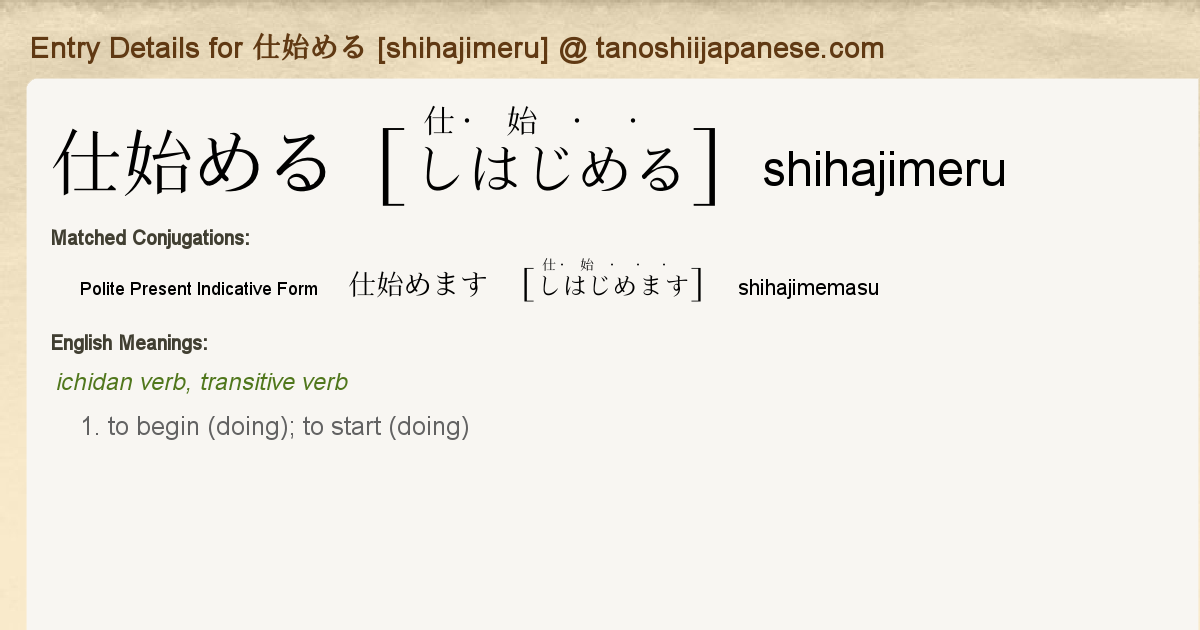



Entry Details For 仕始めます Shihajimemasu Tanoshii Japanese
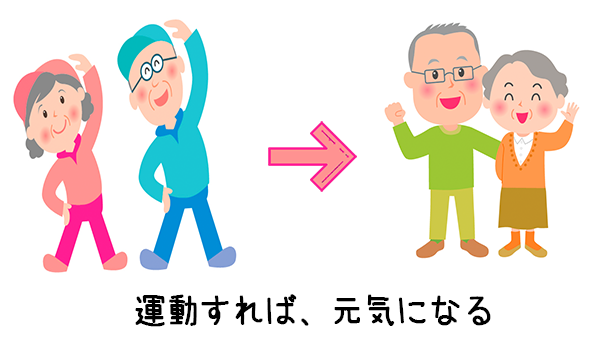



Japanese Vocabulary Lessons Japanese Vocabulary The Shortcut
はじめ, スタート, スタートライン, 出発, 出立, 初め, 初める, 始める, 皮切り 19 滑出し 何かが始まるとされる時間 Beginning the time at which something is supposed to begin Synonyms のっけ, はじめ, とっつき, ぶっつけ, ぶつける, スタート, しょっぱな, キックオフ, すべり出し, 出だし, 出鼻, 出っ鼻, 初め, 初める, 初っ切り, 初口, 劈頭, 取っ付く, 取り付く, 取り付け, 口切りConjugator List of Japanese Verbs Loan Words plus suru Quick guide Present Indicative conjugation guide Past Indicative conjugation guide Passive conjugation guide Transative &Personal moods have different conjugations for each subject, while impersonal moods have only one form ( Parentheses ) indicate present tense verb forms which are also used for the future Brackets indicate literary equivalents




0 All About Japanese Ideas In 21 Japanese Phrases Japanese Language Learning Japanese




Nihongo For Beginners Posts Facebook




Kanji Link Learn Japanese Grammar Jlpt N5 With Free Video Lessons




Japanese Gramma Osi Osi By Camilo Andres Delgado Rodriguez Issuu




Japanese Irregular Verbs Wikipedia




Lingodeer Blog Great Stuff On Language Learning
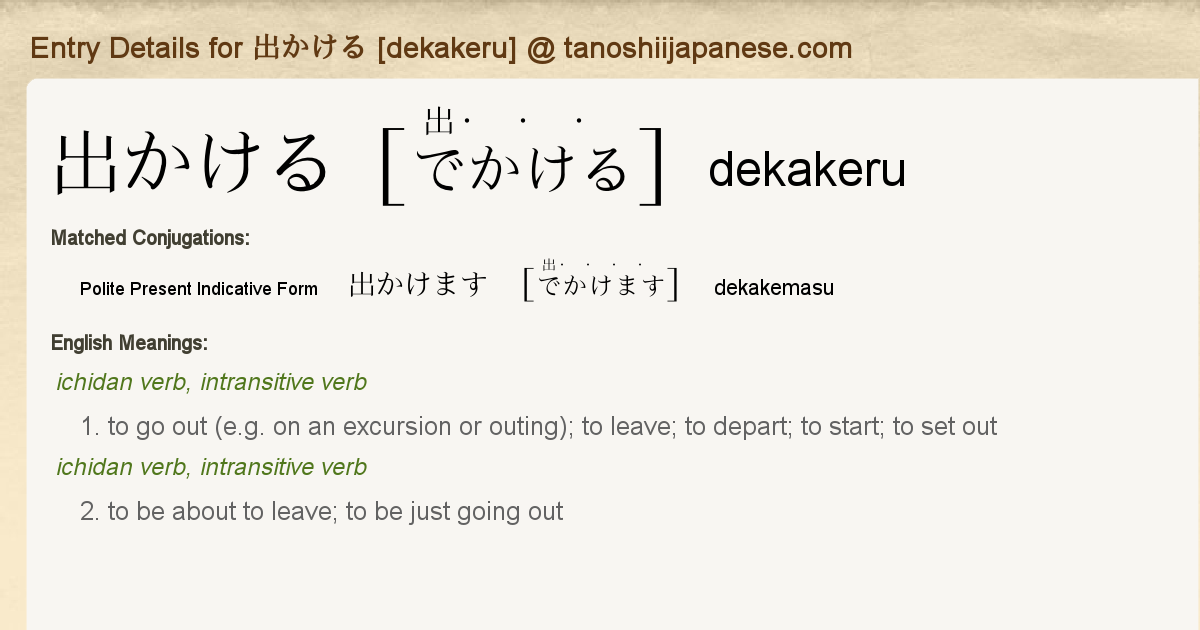



Entry Details For 出かけます Dekakemasu Tanoshii Japanese




Anreg Tumblr Com Tumbex
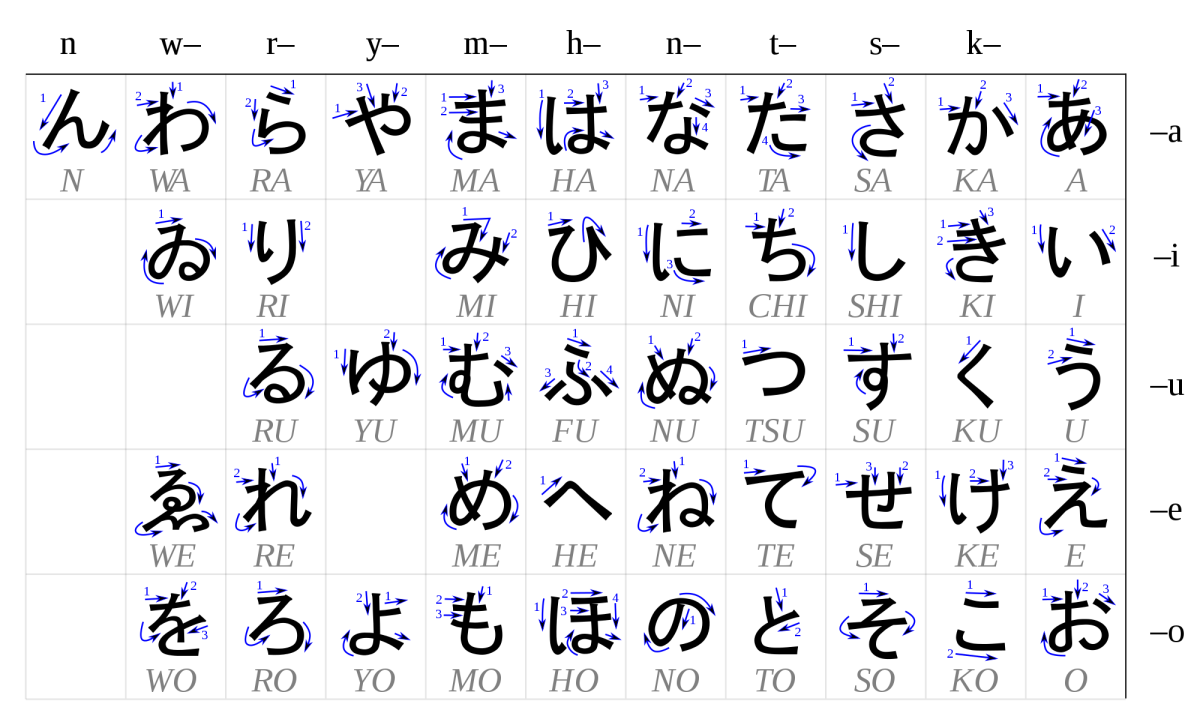



Simple Japanese Verb Conjugation Patterns Owlcation




日本語レッスン 文法 Genki L3 Verb Conjugation Phnom Penh Life ភ ន ព ញ



Verb Tenses And Clauses Learn Japanese




Godan Verbs Japanese With Anime




Conjugation Of Minna No Nihongo 1 Verbs Pdf Txt




日本語レッスン 文法 Genki L3 Verb Conjugation Phnom Penh Life ភ ន ព ញ




How To Understand Japanese Verbs Groups Exceptions Forms Conjugations And Verb Particles
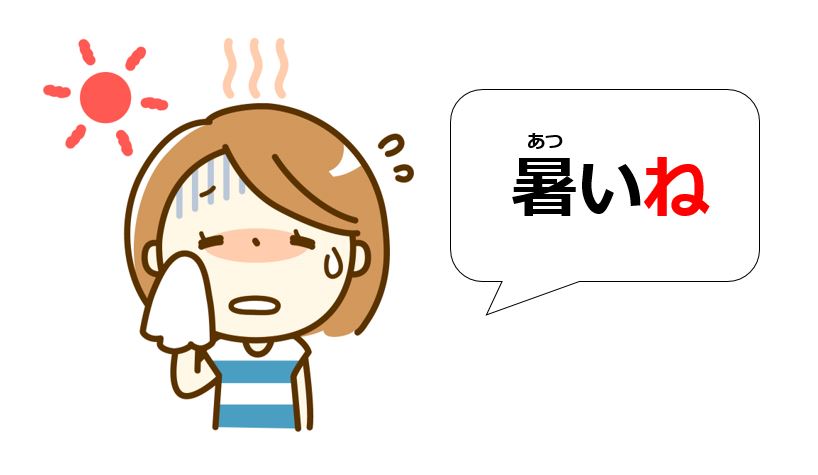



Sentence Ending Particles ね よ And よね




Grammar Introduction In Ejqs Ejqsでの文法導入 Elementary Japanese Quick Simple




Japanese Verb List You Must Remember 50 Verbs




Verb Nai Form Conjugation Group 2 In Japanese Nihongoph




Ren Youkei 連用形 Japanese With Anime
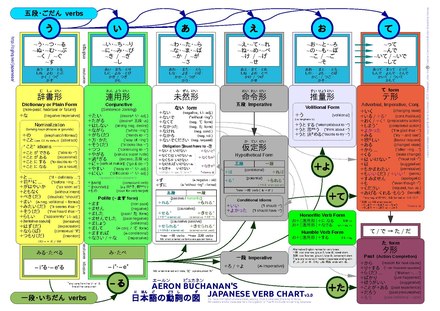



Japanese Verb Conjugation Wikiwand




Assignments Get Casual Conjugation Test Signed And Corrected Intention Worksheet Write 5 Sentences Ppt Download



List Of Japanese Noun Conjugation In Short Long Form Akatsuki Note




Grammar Introduction In Ejqs Ejqsでの文法導入 Elementary Japanese Quick Simple




Infographic Conjugation Of Japanese Verb 取る Toru Http Japanesetest4you Com Flashcard Learn Jlpt N5 Vocabulary E5 8f 96 8b Toru 日本語 学習 英語の勉強



Why Is The Kanji 着 Used In Both Verbs To Arrive And To Wear Quora




Kanji Link Learn Japanese Grammar Jlpt N5 With Free Video Lessons




Verb List And Conjugation




Learn Jlpt N4 Grammar 終わる Owaru Japanesetest4you Com




Speak Japanese Archives Page 2 Of 8 Japanesepod101 Com Blog
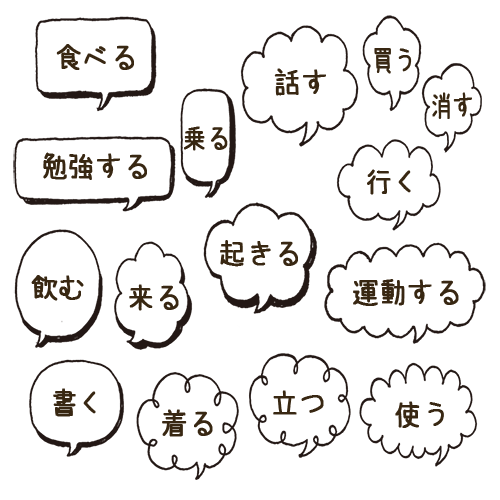



Japanese Vocabulary Lessons Japanese Vocabulary The Shortcut
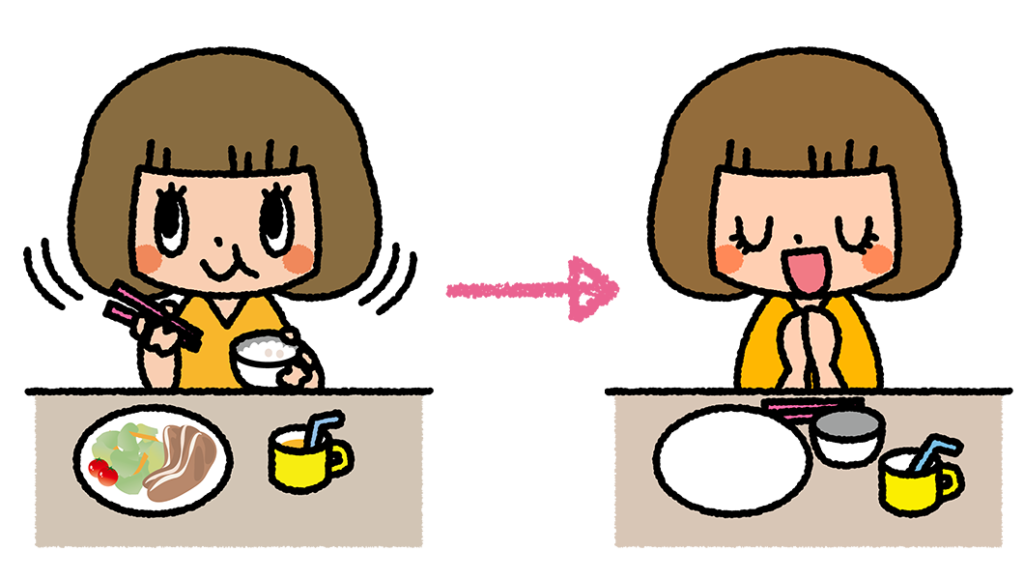



Japanese Vocabulary Lessons Japanese Vocabulary The Shortcut




にほんご活用マスター By 菊池 富美子
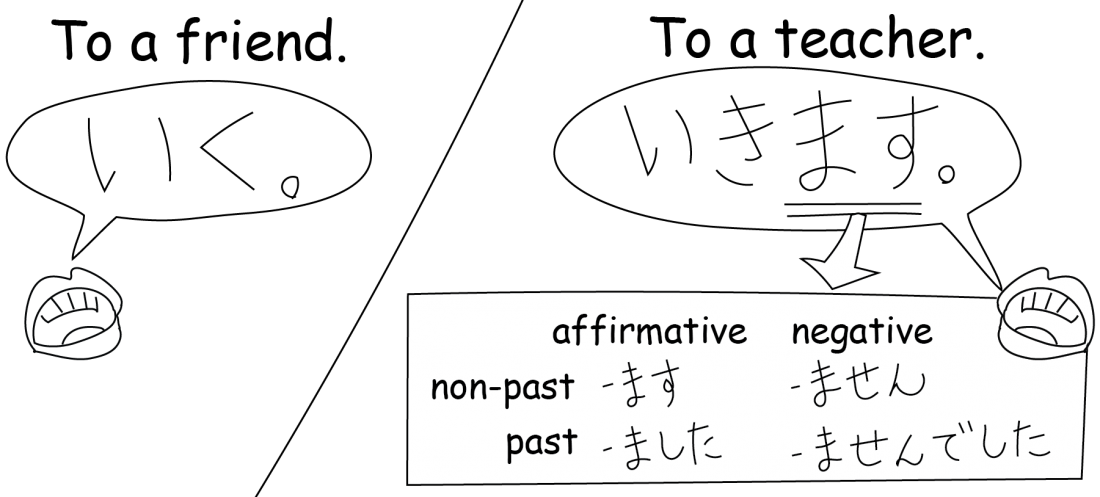



Grammar Introduction In Ejqs Ejqsでの文法導入 Elementary Japanese Quick Simple



List Of Japanese Noun Conjugation In Short Long Form Akatsuki Note




Ru Verbs Rule Ichidan Is Ichiban Itinerant Learner



Q Tbn And9gcstaba7rxucr4nktfbf9wt0jwfih0b703my6g Lfkdlupxlmt4z Usqp Cau




Basic Japanese Verb Conjugations My Asian Life




Assignments Get Casual Conjugation Test Signed And Corrected Intention Worksheet Write 5 Sentences Ppt Download




Essentialj Apanese Grammar By Phuongpham Issuu




How To Understand Japanese Verbs Groups Exceptions Forms Conjugations And Verb Particles




Verb 3 Types In Japanese Ppt Video Online Download




Conjugation Of Minna No Nihongo 1 Verbs Pdf Txt




English Basic Verb Conjugation Dictionary Cognitive Approach 1998 Isbn 4612 Japanese Import Amazon Com Books




戦い Conjugation




0 All About Japanese Ideas In 21 Japanese Phrases Japanese Language Learning Japanese




Level 3 Dictionary Form Minna No Nihongo Ii Verb Conjugation Memrise




Pin On Learn Japanese




Learn Jlpt N4 Grammar 始める Hajimeru Japanesetest4you Com




Lingodeer Blog Great Stuff On Language Learning




A Guide To Japanese Grammar A Japanese Approach To Learning Japanese Grammar Nodrm Pdf Pdf
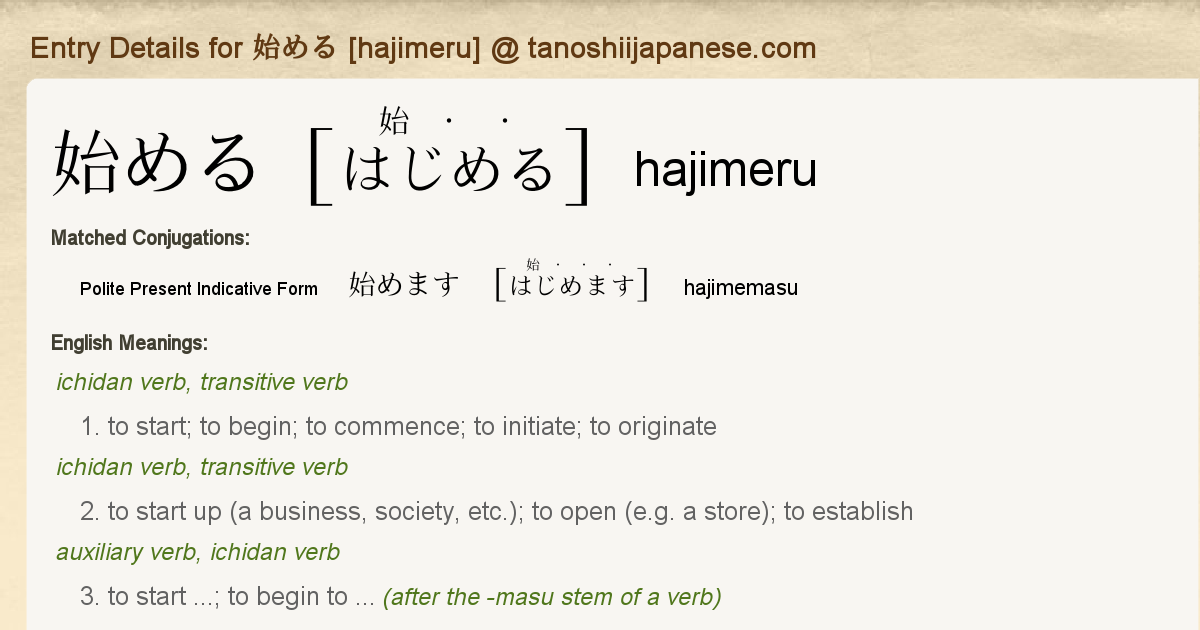



Entry Details For 始めます Hajimemasu Tanoshii Japanese




A Comprehensive Guide To Japanese Verbs




Entry Details For 書き始めます Kakihajimemasu Tanoshii Japanese




Lsj143 田川 Japanese Conjugation And Dm




A Comprehensive Guide To Japanese Verbs




50 Japanese Verbs For Beginners To Remember Ippo Language Learning




Japanese Verb List You Must Remember 50 Verbs
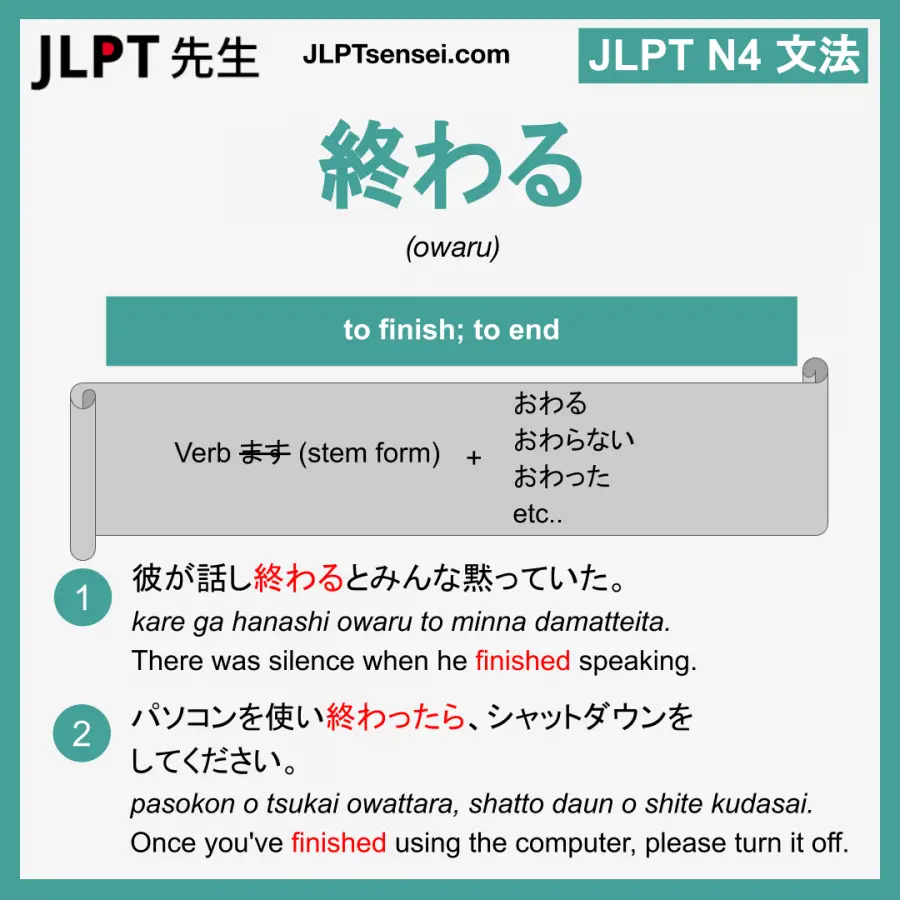



Jlpt N4 Grammar 終わる Owaru Meaning Jlptsensei Com




Conjugating Te Form In Japanese Handy Illustrated How To Guide In 21 Japanese Verbs Japanese Grammar Japanese Language Lessons




Masu Form Te Form Pdf Group 1 Strong Verbs Irregular ます Form かいます たちます すわります Stem Form かい た すわり Course Hero




Learning To Use The Volitional Form In Japanese 意向形 いこうけい




Japanese Lesson 17 Verb Conjugation Group 2 Ojar Online Studio



Learn Japanese Blog By Japanesepod101 Com




Japanese Verb Explore Tumblr Posts And Blogs Tumgir




The Complete Japanese Verb Guide Grammatical Conjugation Verb




Learning To Use The Japanese Volitional Form




Lesson 3 Grammar Pp Ppt Video Online Download



1




Japanese Irregular Verbs Wikiwand
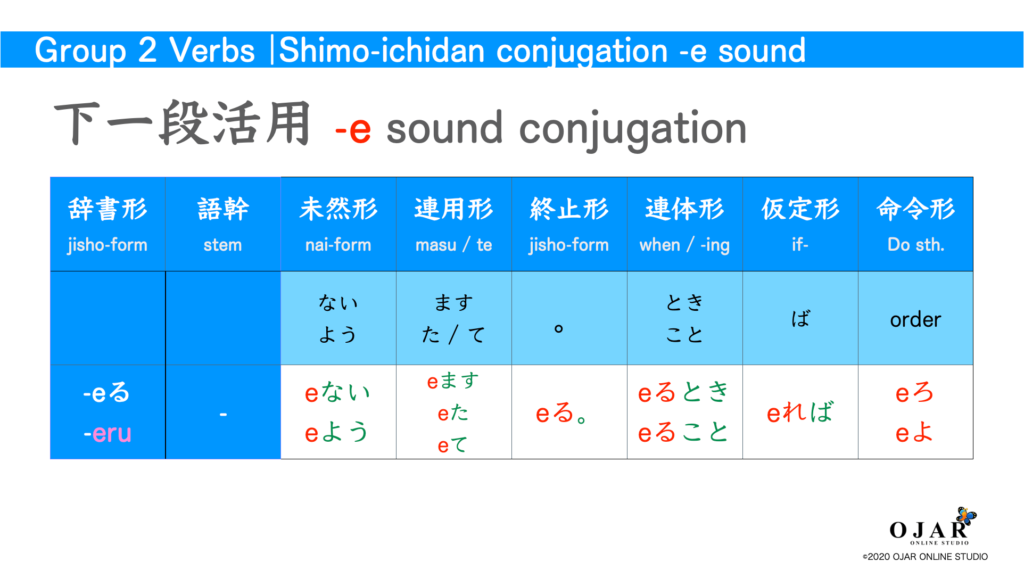



Japanese Lesson 17 Verb Conjugation Group 2 Ojar Online Studio




Japanese Verbs Explore Tumblr Posts And Blogs Tumgir




Team Japanesepod101 Archives Japanesepod101 Com Blog




Kanji Link Learn Japanese Grammar Jlpt N5 With Free Video Lessons




Pera Pera Sakura How I Learn Japanese



空は晴れていますか 曇っていますか Duolingo




A Comprehensive Guide To Japanese Verbs




Japanese Verb Conjugation Wikiwand




Conjugation Of Minna No Nihongo 1 Verbs Pdf Txt




A Comprehensive Guide To Japanese Verbs
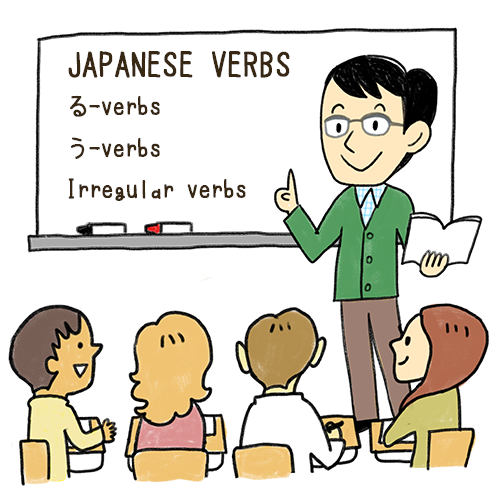



Japanese Vocabulary Lessons Japanese Vocabulary The Shortcut


